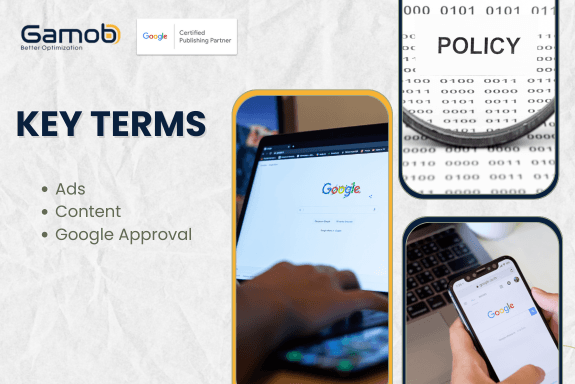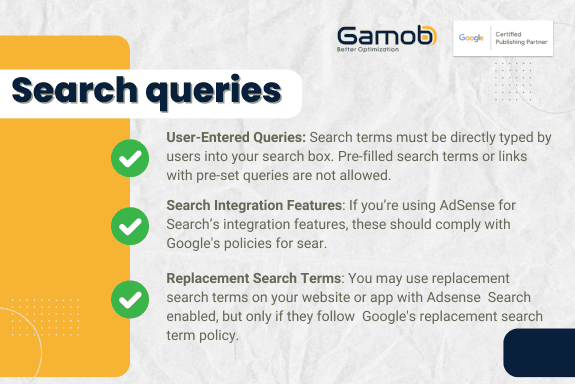
Subscribe to receive the latest blog posts to your inbox every week.
By subscribing you agree to with our Privacy Policy.
AdSense for Search (AFS) is a powerful tool that allows website owners to generate revenue by monetizing their search pages with Google ads. By integrating Google’s search functionality into your website, you can present relevant ads alongside search results, helping you earn revenue while improving user experience.
However, to keep the system fair and effective, Google has set clear guidelines and policies for using AdSense for Search. Understanding these policies is crucial to ensure your account stays in good standing and you maximize your ad revenue.
Let’s find what you need to know about AdSense for Search policies, covering everything from search query management to content guidelines and best practices for seamless integration.
Key Terms You Need to Know
Before we go into the specific AdSense for Search policies, let's clarify some essential terms to ensure you're on the same page:

Ads: These are Google ads displayed alongside search results. They are designed to match user intent and are monetized through either cost-per-click (CPC) or cost-per-impression (CPM). Importantly, this refers to ads provided by Google only – not any third-party ads.
Content: Content refers to all information displayed on your site, including original content, user-generated content, search results, and ads (whether from Google or third-party networks). Everything visible to the user is considered content.
Google Approval: If Google requires approval for any part of your service, it only applies to the usage of Google services, such as displaying Google ads.
These terms are critical to understand, as they form the foundation of AdSense for Search policies. When you use Google’s services, it’s essential to comply with these rules to ensure a smooth and profitable experience.
1. Modifying Search Queries: Keep It Authentic
Google has strict guidelines around the search queries displayed through AdSense for Search. Your search results must reflect real user intentions, and you are not allowed to manipulate or alter search terms. This ensures transparency and fairness for both users and advertisers.

Here’s what you need to know about search queries:
User-Entered Queries: Search terms must come directly from users who type them into your search box. You are not allowed to pre-fill search terms or create links containing pre-set search queries.
Search Integration Features: If you’re using AdSense for Search’s integration features, these should comply with Google’s policies for search integration.
Replacement Search Terms: You may use replacement search terms on your website or app with AdSense Search enabled, but only if they follow Google's replacement search term policy.
The goal is to ensure that all search queries are authentic and based on genuine user intent. Manipulating search queries for increased ad impressions or clicks is strictly prohibited.
2. Don’t Alter the Code: Integrity Is Key
It might be tempting to tweak the AdSense for Search code to better suit your design preferences, but Google’s policies prohibit any modifications. This includes changing how ads are displayed or how search results are framed.
Here are some of the modifications you cannot make:
Framing the Search Results: You cannot frame AdSense search results within another page or modify their presentation. This ensures that the ad experience is not misleading or deceptive.
Changing the Google Logo: The Google logo must appear as intended and cannot be altered or removed. This helps maintain the brand’s integrity and keeps the search results consistent across different publishers.
Ad Quantity and Placement: You are allowed to have a maximum of two AdSense search boxes per page. The placement of ads should follow the guidelines to avoid excessive clutter or disruptive user experience.
Ensuring that the code is used as it is provided helps maintain the quality of the ad experience, ensuring both users and advertisers benefit equally.
3. Use AdSense for Search on the Right Pages
The AdSense for Search code is specifically designed to work on search result pages. You are not allowed to use it elsewhere, such as in toolbars, browser extensions, or third-party applications.
Where You Can Use the Code: Place the AdSense search unit only on pages that display search results. This makes the search process intuitive for users while ensuring that ads are contextually relevant.
Where You Can’t Use the Code: Do not integrate AdSense for Search code into any software applications, such as browser toolbars, widgets, or any non-search page of your site.
By adhering to this restriction, you maintain a seamless user experience while ensuring the ads are shown in the right context for maximum relevance.
4. Content Guidelines: Keep It Clean and Compliant
Google’s policy on content is clear: any searchable content on your site must comply with Google’s guidelines. Your content should not focus on illegal, pirated, or otherwise prohibited materials.
Avoid Copyrighted Content: Do not display content that infringes on copyrights or violates Google’s content guidelines. Websites hosting illegal content or violating these guidelines may be banned from using AdSense for Search.
Compliant Content: Your content must align with Google’s Webmaster Guidelines and provide users with valuable, relevant, and original information.
By focusing on providing high-quality, compliant content, you help ensure a positive user experience and reduce the risk of account suspension.
5. No Search Incentives: Genuine User Engagement Only
Google has strict rules about incentivizing users to perform searches or click on ads. You are not allowed to offer any form of compensation for users to interact with your search results or ads.
Prohibited Incentives: Don’t offer rewards, money, or anything else in exchange for users performing searches or clicking on ads. This kind of manipulation can result in penalties or account termination.
This policy ensures that the search activity remains organic and driven by real user interest, rather than artificial incentives designed to inflate ad interactions.
6. Search Term Limits: Keep It Fair
There are limits on the number of search terms that can be processed through your account. Google restricts the total number of search terms to 5 billion per account annually, from August 1st to July 31st.
Why the Limit?: This limit ensures that the search term process remains manageable and prevents any abuse of the system. It helps keep the quality of search data high and ensures fair usage across all publishers.
By respecting these limits, you help maintain the integrity of the system and ensure fair usage for all AdSense for Search users.
Why Adherence to These Policies Matters
Complying with AdSense for Search policies is essential for several reasons:
Better User Experience: By following these rules, you ensure that the user experience remains positive, smooth, and relevant. Users will see ads that match their search intent, leading to better engagement and conversions.
Higher Revenue Potential: When ads are properly targeted based on genuine search behavior, they become more relevant to users, increasing the likelihood of clicks and engagement. This can translate to more revenue for you as a publisher.
Account Protection: Violating these policies could lead to penalties, including the suspension of your account. By sticking to the guidelines, you protect your account and ensure consistent revenue generation.
Maintaining Google’s Ecosystem: These policies are in place to ensure the integrity of Google’s advertising ecosystem. By adhering to them, you contribute to a fair, transparent, and effective advertising platform for everyone.
AdSense for Search is an excellent tool for monetizing your site’s search traffic, but it comes with clear policies that you must follow. These policies ensure that search queries are authentic, ads are displayed correctly, and content is compliant.
By understanding and adhering to these policies, you not only protect your account from potential penalties but also create a better user experience that leads to higher engagement and more revenue. Whether you’re a seasoned publisher or new to AdSense, following these policies will help you get the most out of AdSense for Search while ensuring a seamless, profitable experience for everyone involved.
However, it is so complicated if you do not really understand about the operation of Adsense for search (AFS), so one of the good solutions is to collaborate with GCPP to support you. Instead of handling AFS implementation yourself, partner with experts like Gamob, a Google Certified Publishing Partner. With over five years of experience, we help publishers maximize revenue by seamlessly integrating Google’s advertising solutions.
[Source: Google.com]
---------------------
Gamob | GCPP - Empower your monetization journey
Email: [email protected]
Website: www.gamob.com
Linkedin: www.linkedin.com/company/gamob-gcpp